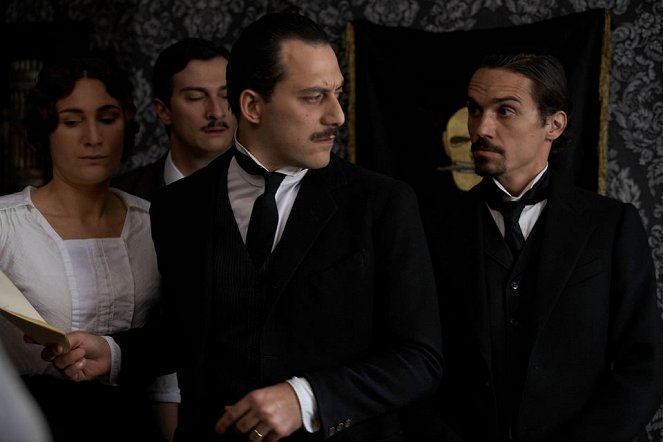Director:
Marco BellocchioCámara:
Daniele CiprìMúsica:
Carlo CrivelliReparto:
Giovanna Mezzogiorno, Filippo Timi, Corrado Invernizzi, Fausto Russo Alesi, Michela Cescon, Gianni Schicchi Gabrieli, Paolo Pierobon, Carlo Crivelli (más)Sinopsis(1)
Hay un secreto en la vida de Mussolini. Una mujer y un hijo, Benito Albino, que nació, fue reconocido y después negado. El secreto tiene un nombre: Ida Dalser. Es una página oscura de la historia ignorada en la biografía oficial de el Duce. Cuando Ida se encuentra con Mussolini en Milán, éste es editor de Avanti! y un socialista ferviente que planea guiar a las masas hacia un futuro anticlerical, antimonárquico y socialmente emancipado. Ida ya había tenido un fugaz encuentro con él en Trento, y había quedado fascinada. Ella cree realmente en él y en sus ideas. Para financiar Il Popolo d'Italia, un periódico que él ha fundado y núcleo del futuro Partido Fascista, Ida vende todo lo que tiene. Al estallar la Primera Guerra Mundial, Benito Mussolini se alista en el ejército y desaparece. Cuando Ida vuelve a encontrarle está en un hospital militar cuidado por Rachele, con la que se acaba de casar. Ida arremete furiosamente contra su rival, exigiendo sus derechos como verdadera esposa de Mussolini y madre de su hijo. Es expulsada por la fuerza. Durante más de once años, es encerrada en una institución mental (y su hijo en un centro), donde es recluida y torturada, para que no pueda volver a ver a su hijo nunca más. Pero Ida no se rinde sin luchar... (Vértigo Films Esp.)
(más)Videos (2)
Reseñas (2)
Above all, it's a formally interesting film that may get you by how it's shot more than by what's depicted in it. Benito Mussolini is certainly not an uninteresting subject, but this is not a film that is primarily about him. It's about what power can do, how it can change you, and how it can destroy others and throw them into a role they didn't want or expect.
()
In my opinion, the film is not primarily an attempt to depict the obscure love of a woman and a dictator. For that, the psychology of the characters would be too simple and unchanging from one moment on. Therefore, we should rather understand the film as a more general critique of fascism/Mussolini, in which the film form plays a crucial role with the use of alienating effects in the form of period materials. Furthermore, while up until the turning point Mussolini (F. Timi) appears on screen as himself and can be perceived as a human character (with all his flaws), from the moment of the turning point, he presents himself as a perfect duce through period footage. From that moment on, the internal imperfection = inherent self-destruction of fascism also manifests itself, as it tries to destroy the people who are: 1) the duce's biggest supporters - Ida, who will never stop loving Mussolini and thus will never leave the psychiatric clinic, 2) the duce himself - accomplished by destroying his own namesake son, who in the end transforms into his own father (and is therefore also locked up in a psychiatric clinic), symbolized on the film plane by assigning the role of the son to the actor who played Mussolini's father in the first half. In other words, the more perfect the image of the duce in front of the public, the greater the decline of the real duce (or his "alter ego" in the form of his son and devoted love). The criticism of the role of the Catholic Church is also very subtle: there were many compassionate individuals within it, but it is the church as a whole that actually keeps Ida captive to fascist tyranny throughout the film.
()
Galería (35)
Foto © IFC Films



Anuncio